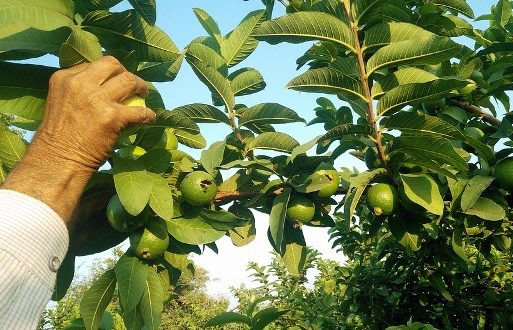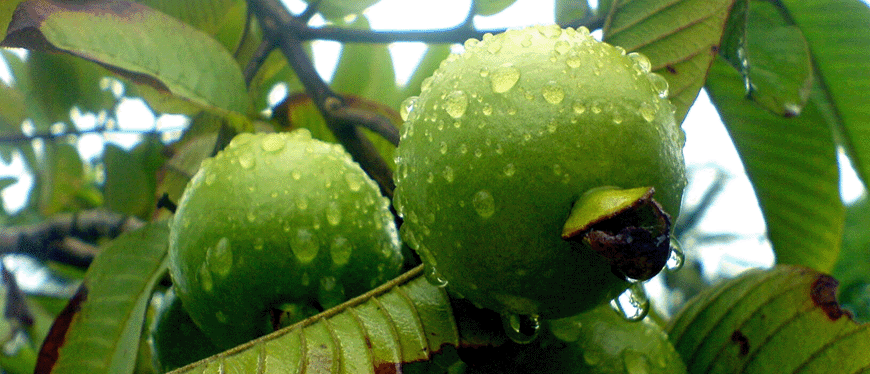Crop Production
Guava (Psidium guajava): Guava trees are not very long-lived and may bear heavily for 15-25 years. The trees often begin to bear fruit within a year of planting. The guava bears fruit all year round. The vegetatively grown plants start bearing at 3rd year and continue to give economic yields yearly for 30 years. The well grown and well cared trees gives annual yield from 100 to 150kg. The fruits should be harvested at full maturity but in semiripe conditions.
Harvesting and Yield
-
 Harvesting
and Yield: Guava fruits attain
maximum growth, sucrose and pectin contents after 100 to
110 days from fruit set. Individual handpicking of
fruits at regular intervals when they turn greenish
yellow and are firm is suggested. Being highly
perishable, they have to be marketed immediately after
harvest but are sometimes stored for two to three days.
Wooden crates and bamboo baskets are usually used to
transport the guava fruits. Positioning of fruits in
natural posture with pedicel end vertically upward
result in better keeping quality. Vegetatively
propagated plants take 2 - 3 years and seedlings take 4
- 5 years to yield. Economic yield is obtained from 7 -
8 years after planting. An average of 500 - 800 fruits
may be harvested from a tree / year. Under good
management, about 1000 fruits can be expected from a 10
year old plant. The trees lives up to 30 to 40 years,
but productivity generally declines after the 15th
year.
Harvesting
and Yield: Guava fruits attain
maximum growth, sucrose and pectin contents after 100 to
110 days from fruit set. Individual handpicking of
fruits at regular intervals when they turn greenish
yellow and are firm is suggested. Being highly
perishable, they have to be marketed immediately after
harvest but are sometimes stored for two to three days.
Wooden crates and bamboo baskets are usually used to
transport the guava fruits. Positioning of fruits in
natural posture with pedicel end vertically upward
result in better keeping quality. Vegetatively
propagated plants take 2 - 3 years and seedlings take 4
- 5 years to yield. Economic yield is obtained from 7 -
8 years after planting. An average of 500 - 800 fruits
may be harvested from a tree / year. Under good
management, about 1000 fruits can be expected from a 10
year old plant. The trees lives up to 30 to 40 years,
but productivity generally declines after the 15th
year.

